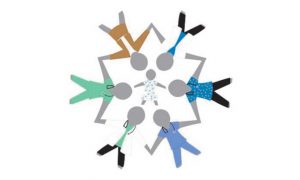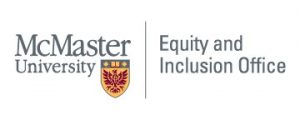Expandable List
McMaster University is proud to offer the extended benefit of an Employee and Family Assistance Program (EFAP) with our partner, Telus Health.
Individuals can contact Telus Health through their website or by phone toll-free, 24 hours a day, 7 days a week to book appointments, or access any EFAP service.
- Toll Free: 1.833.366.4544
- Visit: Telus Health Virtual Platform
- Download: LifeWorks Mobile App
McMaster offers robust, market-driven total rewards packages featuring compensation, benefits, retirement savings plans/pensions, time off and performance and service recognition.
Total rewards offerings are specific to each employee group at McMaster, click the link to review all benefits plans by employee group which can be used for private counselling.
https://hr.mcmaster.ca/employees/total-rewards/
The Advisor, Professionalism and Faculty Lead are available to all Faculty of Health Sciences learners, staff, and faculty members. Their focus is to attend to issues of professionalism in an objective, impartial, empathetic and confidential manner. They can provide a listening ear, advice, options and advocacy.
Students, staff and faculty can approach the FHS Professionalism team in confidence or even anonymously.
Confidentiality will be guaranteed unless there is disclosure of imminent harm to one’s self, to others, or harm to a minor.
Consultation and Advice
The Advisor, Professionalism has expertise and applied knowledge in the areas of human rights, discrimination and harassment laws, particularly as they relate to complex issues in the academic and clinical settings. The Advisor, Professionalism and Faculty Lead are committed to the development of an environment conducive to the professional development and optimal functioning of learners, trainees, fellows, and faculty members in FHS.
Mediation / Resolution
As a resource to the faculty leadership, the Advisor, Professionalism will have a sound understanding of the clinical environment and linkages with the various hospital processes and personnel. This enables the Advisor, Professionalism to provide an informal, voluntary, remedial conflict resolution process under appropriate McMaster University policies.
| Location |
|
| Phone / email |
|
| Hours | |
| Website | |
| Quick Links |
Within the workplace, it is not uncommon to encounter situations that may be personally challenging and difficult to navigate – requiring professional input when considering ways to tackle such situations. In addition to this, holding a position of leadership within an organization can place an immense amount of pressure on an individual, especially when handling difficult situations in which a variety of factors must be considered prior to approaching the situation and making decisions – some in which may greatly impact the employees involved and the workplace itself.
The Key Person Advice Line, provided by Telus Health, is an extremely helpful tool to utilize when faced with complicated workplace situations. The 24/7 accessible advice line allows managers, supervisors, owners, or union representatives to connect with Telus Health senior level clinicians should a situation arise within the workplace that may need or could benefit from professional input.
Situations that benefit from consultation and coaching through The Key Person Advice Line include but are not limited to:
- Workplace Conflict
- Employee Problems
- Unusual Employee Behaviour
- Providing Assistance to Employees
- Strategies for Assisted Referrals
| Location/Website | |
| Phone/Email |
|
| Hours |
|
| Features of the Advice Line |
|
Information on how to Recognize, Respond and Refer within the McMaster environment in terms of issues relating to discrimination and harassment.
Visit McMaster’s Discrimination & Harassment Guide here: https://secretariat.mcmaster.ca/app/uploads/Discrimination-and-Harassment-Policy.pdf
A psychologically healthy work environment supports employee engagement, worker health and well-being, recruitment and retention, productivity, effective risk management and corporate social responsibility. The supports provided at McMaster aim to foster mental wellness in you and those you know. https://hr.mcmaster.ca/employees/health_safety_well-being/my-health/
Workplace Accommodation Policy
McMaster University Guide and Procedures on Workplace Accommodation
Employee Request for Medical Accommodation Form
Faculty and instructors must feel prepared and comfortable to address student needs in ways that are consistent with and appropriate to their roles.
The Professor Hippo-on-Campus program has been designed and tested to help accomplish these goals in an accessible and engaging 8 module format. You will learn a lot about what’s available and what to do to support student mental health.
For more information, visit here: https://mentalhealth.mcmaster.ca/initiatives/professor-hippo/
Adversity can hit at any time. Though it may not affect us directly, it’s important to remain conscious that you may not entirely know what another individual deals with, both in and outside of the workplace. Mental health awareness is not just significant to one’s own self, but further in increasing awareness and utilizing empathetic approaches when it comes to interactions with others. McMaster University provides resources for employees specific to supporting faculty and staff in times of distress.
It can be increasingly difficult and provoke feelings of anxiety when one comes to know of another’s distress and situation. The tool of The 3 R’s (Recognize, Respond, Refer) can be used to provide support and guide respectful communication. By keeping these strategies in mind, in addition to various additional resources provided by the university, a sense of unity and community can be built amongst employees. Each of the 3 R’s has additional resources as well, which can be useful in assisting individuals in such situations.
Recognize the signs: Having a framework for recognition of distress, and how to respond helps provide support when talking to colleagues about concerns.
Respond with respect & concern: Reaching out to a colleague shows care and concern, and opens a dialogue to check how they are doing.
Refer to appropriate resources: It’s okay to be uncertain about how to respond. You don’t need to have all the answers.
Having access to the right resources in times of need is a necessity McMaster recognizes. We truly want employees to prioritize their well-being while remaining wary of the struggles outside of just themselves. By accessing such resources, employees can most definitely work towards becoming their better selves and learn to navigate situations of adversity.
| Location/Website | https://hr.mcmaster.ca/employees/health_safety_well-being/my-health/mental-health-resources-and-training/supporting-faculty-and-staff-in-distress/ |
| Phone/Email |
|
| Additional Info | If It Is an Emergency:
If at any time it is believed that the health or safety of members of the McMaster community is at risk, the appropriate authority or University office must be informed. Any reference to ending one’s life, suicide or threat of violence must be taken seriously. What this might look like:
How to refer:
For emergencies at other campuses:
Employee and Family Assistance Program (EFAP) – Telus Health:
|
The President’s Advisory Committee on Building an Inclusive Community (PACBIC) aims to identify and anticipate issues affecting equity-seeking communities both within the University and relevant to those seeking access to the University, and to advise the President on such issues.
PACBIC is made up of organizational members who identify and anticipate issues affecting equity-seeking communities (including but not limited to First Nations, Métis and Inuit persons, members of racialized communities, newcomers and refugees, members of diverse faith communities, persons with disabilities, LGBTQ-identified individuals, and women) both within the University and relevant to those seeking access to the University, and advise the President on such issues.
Working Groups:
- Priorities and Planning
- Disability, Inclusion, Madness, Accessibility, Neurodiversity (DIMAND)
- First Nation, Métis and Inuit Priorities (FNMI)
- Gender and Sexuality
- Interfaith
- Race, Racialization, and Racism
| Contact info | |
| Website |
|
The Equity and Inclusion Office (EIO) is a central resource where expertise is proactively drawn upon by administrators, faculty, staff, and students: to advance unit-specific and institutional equity, diversity, inclusion, and accessibility goals; to enact inclusive excellence principles; and to establish respectful living, learning, and working environments that are free from harassment and discrimination, and sexual violence including through timely and procedurally fair investigative and alternative dispute resolution processes.
The Equity and Inclusion Office (EIO) promotes and supports institution-wide commitments to equity, diversity, inclusion, and accessibility, and principles of inclusive excellence, to foster a campus culture and community that respect the human rights, integrity and dignity of all community members.
Programs & Services
- Human Rights & Dispute Resolution – provides confidential complaint resolution according to the policies on Discrimination, Harassment, and Sexual Violence.
- Inclusion & Anti-Racism Education – provides educational opportunities related to harassment, discrimination, anti-oppression, accessibility, accommodation, and other human rights-related issues.
- Accessibility Program – provides consultation and advice on the identification, removal and prevention of barriers to accessibility within the University’s systems, structures and policies.
- Sexual Violence & Prevention Response (SVPRO) – provides inclusive and trauma informed response; prevention education and response training; community consultation and referral.
| Location |
|
| Contact info |
|
| Hours |
|
| Website |
Though we may not always recognize it within those around us, many of us are often affected by mental illness at some point in our lives, and those of us who do not have a mental health concern ourselves, will have a friend, colleague, or family member who is dealing with a mental health issue. Whether it be ourselves or people close to us, encountering issues involving mental illness can be challenging and overwhelming, often needing guidance through mental health resources and training in order to better support and promote wellbeing in ourselves and those we know.
Human Resources Services at McMaster University offers a variety of mental health resources and training for employees, managers, and leaders – both with the aim of providing strategies to support wellbeing at work and at home.
| Location/Website | Mental Health Resources and Training
|
| Email/Contact | Human Resources Services
Employee Well-Being Contact:
|
| Quick Links |
Faculty Affairs strives to enhance the faculty experience by promoting and championing an inclusive, culturally safe environment, enhancing faculty wellness and engagement, facilitating professional development, developing leaders, and advancing professionalism across the Faculty of Health Sciences. Please note the website is a work in progress.



